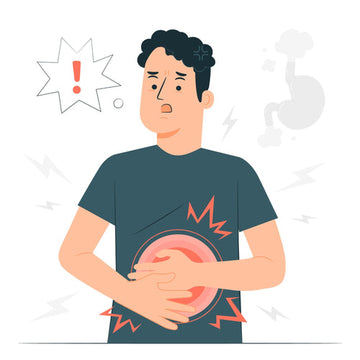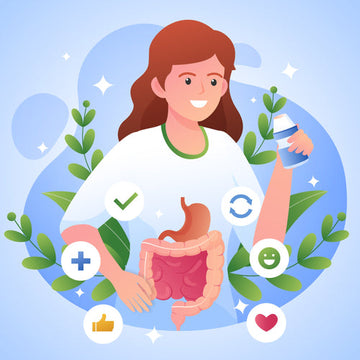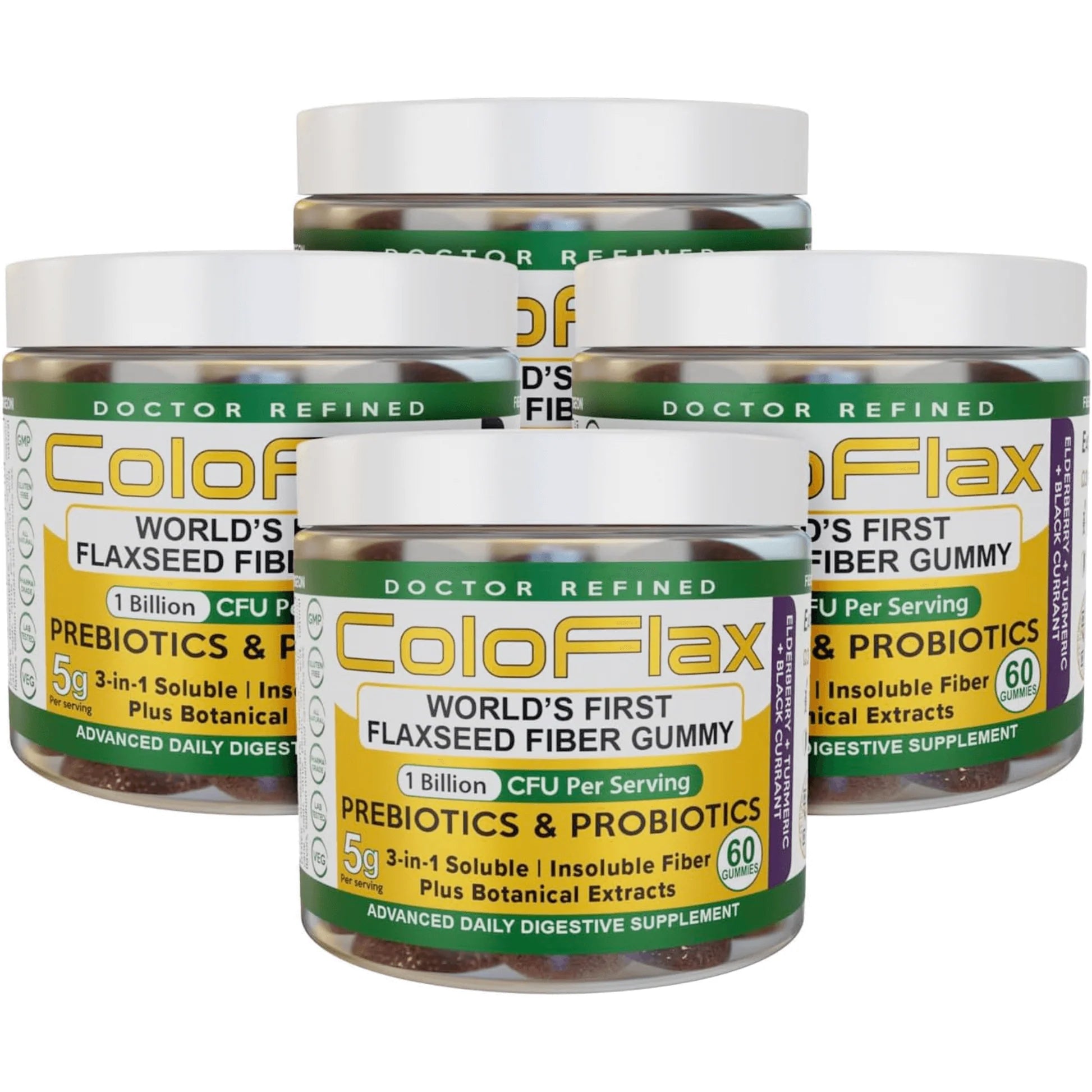Beneficial bacteria. Probiotics. Prebiotics. You’ve no doubt heard these terms being bandied about, as they’re pretty hot topics in the world of nutrition these days. But what do they mean and, more importantly, what’s the difference between pre and probiotics?
What are Prebiotics and Probiotics?
Both prebiotics and probiotics help to maintain optimal gut health, ensuring your gut bacteria—also known as the gut microbiome—are healthy. However, the actual roles played by pre and probiotics are slightly different.
Probiotics are live bacteria that contribute to the gut flora; prebiotics are the foods on which these bacteria feed.
Think of your gut as a garden in which you’re trying to grow some luscious flowers. The probiotics are the seeds from which the flowers sprout while the prebiotics are the fertilizer and nutrients on which they thrive.
You can just toss the seeds onto the ground and hope they grow, but you won’t get very far if the conditions aren’t right.
A healthy gut, therefore, is one that has a balance of probiotics and prebiotics.
Where Do Prebiotics and Probiotics Come From?
You can get prebiotics and probiotics from supplements. In fact, the prevalence of probiotic drinks, yogurts, and tablets means that many consumers now think this is the only way to consume probiotics.
But we actually get prebiotics and probiotics from our diet. You can supplement with them if you need to, and this is recommended in certain circumstances (more on that below), but it’s best to start with a healthy diet and build from there.
What is the Best Prebiotic Food?
Prebiotics are types of fiber found in plant-based foods, including fruits and vegetables. This is why you’ll often hear prebiotics referred to as “prebiotic fiber”.
The body can’t digest this prebiotic fiber, but when it reaches the lower digestive tract, it becomes a food source for the healthy gut bacteria that reside there.
Some of the best prebiotic foods include:
- Flaxseeds
- Garlic
- Onions
- Barley
- Chicory Root
- Berries
- Bananas
- Oats
- Beans
- Dandelion Greens
- Peas
What is the Best Probiotic Food?
A good-quality natural yogurt will give you a healthy dose of probiotics, as well as lots of protein, calcium, and other essential nutrients.
The problem is that most of the yogurts consumed in the United States are loaded with sugar and flavorings and don’t have any of those healthy live cultures. Kefir is another great source of healthy gut bacteria. It’s a type of fermented yogurt that’s cultured from kefir grains.
Look for terms like “bio”, “live”, “natural”, and “probiotic” for a gut-healthy, protein-rich feast.
If you’re lactose-intolerant or following a vegan diet, look for unpasteurized fermented foods like pickled vegetables. Sauerkraut is one of the best vegan probiotics, but you can also drink kombucha or eat pickles and kimchi.
Why Would I Need Prebiotic and Probiotic Foods?
If we get prebiotics and probiotics from food, then why can’t we just let things take care of themselves? Why do we need prebiotic and probiotic supplements?
Well, firstly, there’s no harm in topping up your daily fiber, prebiotic, and probiotic intake with a supplement like ColoFlax. It’s all-natural and can support digestive health. But there are some people who may benefit more than others.
If any of the following ring true, you should take a closer look at your diet and think about pre and probiotic supplements:
You Have Chronic Gut Symptoms
Do you find that you’re constantly battling against symptoms like gas, bloating, diarrhea/constipation, and heartburn, even though there are no obvious causes? It could be related to your gut flora.(1)
If the balance of bacteria is not right, you may have issues processing waste and this could be causing your symptoms.
Of course, any time you’re experiencing chronic symptoms seemingly unrelated to your diet, you should check with your doctor and rule out anything serious. But if you’ve done all of that and you still don’t feel like yourself, consider adding more pre and probiotics to your diet.
You Have a Poor Diet
What does your average day look like?
How much sugar do you consume? How much fiber do you eat? Are you eating a lot of processed foods or sticking with whole foods?
All of these things could affect your gut flora.
The recommended dietary fiber intake for an adult woman is 25 grams and this increases to 38 grams for men. However, most Americans consume between 10 and 15 grams. Not only can this affect how waste is moved through the colon, but it reduces the intake of prebiotic fiber and could even increase the risk of heart disease.
Even if you think you’re getting enough fiber, you could be harming your intestinal flora in other ways. For instance, studies show that diets rich in refined sugar lead to higher levels of pro-inflammatory bacteria, as well as lower levels of anti-inflammatory bacteria. In other words, your body has more of the bad bacteria and less of the good.(2)
Soft drinks, fruit juices, candy, fast food, and even the bread you buy from the grocery store can be loaded with added sugar. It’s everywhere—we’re addicted to the stuff. You don’t need to abstain completely, but if you’re struggling with gut problems and other health issues, or you just want to do something good for your body, consider eliminating these refined sugars.
You Have Recently Taken A Course of Antibiotics
Antibiotics were one of the greatest human discoveries of the 20th century, if not all of human history. They have saved millions of lives and if you’re ever had a tooth infection, chest infection, or have undergone surgery, there’s a good chance they have saved your life as well.
But while antibiotics can kill all of the bad and harmful bacteria, they can also do a number on the good bacteria.
Numerous studies have shown that antibiotics can adversely affect gut bacteria and may lead to a host of other problems if the balance is not redressed. Some of the most concerning studies have noted that antibiotic use in children could lead to negative outcomes later in life, including allergies, asthma, and obesity.(3)
Of course, that doesn’t mean you should refrain from using them altogether. After all, it’s better to be constipated than riddled with disease. But if you were recently prescribed a course of antibiotics and feel like your digestive system is a little “off”, you may want to consider pre and probiotic supplements.
Your Stress Levels are High
If you’re constantly stressed, anxious, and worried, your gut may suffer. Stress and digestive issues are directly linked. Not only can higher levels of stress increase your risk of constipation and other problems, but if you’re constantly struggling with gas, bloating, and your bowel habits in general, you may be stressed more often.
A probiotic or prebiotic supplement isn’t a magic bullet and won’t fix all of your problems, but it could make a big difference.
You should also look into ways that you can destress and relax more often, including:
- Spending more time with your loved ones
- Meditating or practicing yoga
- Going for long walks
- Turning off your phone during the evening
- Exercising regularly
- Reducing your alcohol intake
- Drinking less caffeine
- Stop taking your work home with you
Not Getting Enough Sleep
Sleep, just like stress, is closely linked to digestive issues. A lack of sleep can also make you more stressed and anxious.
Insomnia is incredibly common, and it’s often linked to lifestyle factors such as working long hours, consuming too much caffeine, drinking too much alcohol, or being glued to a smartphone day and night.
If you have a habit of staring at your phone throughout the evening and only putting it down when you’re about to sleep, consider changing your habits. Take a long bath, read, and leave your phone alone. Turn off your alarm clock on the weekends and during the holidays, and if you need to wake up early for work, go to bed earlier.
Are Pre and Probiotics Safe?
Prebiotic and probiotic supplements are safe and well-tolerated. They contain natural fibers and bacteria and are designed to restore the balance of healthy bacteria in your gut.
However, you may experience some side effects after taking these supplements. Side effects include an increase in gas and a change in bowel habits. They are usually short-lived and things typically settle down within a week or two.
These symptoms are often nothing more than a mild annoyance and are just your body’s way of adjusting. If you have ever switched from a low-fiber to a high-fiber diet, you will have experienced something similar.
You should refrain from taking probiotic supplements if you have an autoimmune problem, are critically ill, or have recently had surgery. Some reports suggest that these conditions can increase the risk of adverse effects, though you can always just consume them in their natural form. Alternatively, discuss probiotics with your doctor if you have any concerns.
Do Prebiotics and Probiotics Make You Poop?
Prebiotics and probiotics are not laxatives, and so they won’t force a bowel movement in the same way as common laxatives. However, they do contain bacteria and fibers, and these could improve your gut health and increase regularity.
So, while you won’t necessarily rush to the toilet in the same way as when you take a laxative, they might instigate a bowel movement the following day.
Prebiotics vs Probiotics: Which is Best?
There is no “better” option here. It would be like comparing fats and fiber or vitamins and minerals. They might perform different functions, but your body needs both of them. If you’re struggling with any of the issues highlighted above, you should consider increasing your intake of prebiotic fiber and fermented foods and/or adding supplements to your diet.
There’s no way of knowing which of the two you’re lacking, but there’s also no harm in eating a little more natural yogurt and fiber, so you have nothing to lose.
Should You Take Prebiotic and Probiotic Supplements Together?
Of course! Taking a prebiotic supplement along with a probiotic will allow the former to feed the latter. But it’s important to remember that you don’t necessarily need supplements, and you shouldn’t rely on them.
As the name suggests, supplements are designed to “supplement” your diet. They are not complete solutions and work best when they are used as part of a healthy and balanced diet.
Summary: Pre and Probiotics
Prebiotics and probiotics are essential for optimal gut health and while they’re often consumed in supplement form, you can get most of what you need from food. By supporting your gut bacteria, prebiotics and probiotics can help with everything from regular constipation and diarrhea to gas, bloating, stress, and insomnia.
Think about whether you need more pre and probiotic foods in your diet and consider a supplement if you think it will work.
ColoFlax, for instance, contains both prebiotics and probiotics, as well as fiber, omega-3s, and a host of antioxidant compounds.
References
- https://www.health.harvard.edu/blog/should-i-be-eating-more-fiber-2019022115927
- https://www.ncbi.nlm.nih.gov/pmc/articles/PMC7284805/
- https://www.ncbi.nlm.nih.gov/pmc/articles/PMC7732679/






